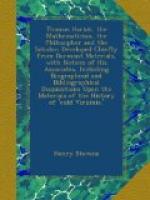Raleigh, besides being the half-brother and representative of Sir Humphrey Gilbert, held also a large share in that venture. Gilbert’s real aim, policy and plan, in this last yearof his patent, to prospect for a suitable place in which to take possession and found a colony, was to begin at the south and work northward as the French had done, but his previous failures since 1578, the inevitable impediments and delays, the advanced season of this his last year 1583, and the necessity of making a final strike for success, in behalf of himself and his assignees, compelled him at the last hour to go direct to Newfoundland, take possession, and then, if thought best, work southward. He was however unquestionably influenced or professed to be by rumours of metals or gold mines in Newfoundland. This northern passage was his fatal mistake. Had he taken a middle or southern course say between 37° and 42° he might perhaps have succeeded.
Under these circumstances Hakluyt’s Discourse of Western Planting was written, and may be considered as a digest of many plans without much originality and a consolidation of many interests. Hakluyt and Raleigh were at Oxford together, but we find no particular evidence of their intimacy before the Spring of 1584, when Hakluyt had returned to London from Paris with his Discourse, or perhaps it was partly written in England. It is pretty certain that it was not shown to the Queen before the date of the Patent, the 25th of March, as Hakluyt speaks of her seeing it in the summer. It was probably intended principally for the promotion of the interests of the Patent in Parliament.
At all events with his investigations in France Hakluyt’s Discourse became thoroughly English in its tone and tenor, and from this time he labored zealously in the interests of Raleigh. A main point of inquiry in Paris was to avail himself of the many opportunities at the Spanish and Portuguese embassies, and with the French merchants and sailors of Paris, Rouen, Havre and Dieppe, to pick up the particulars of the West India trade of the Spaniards, and the nature of the French dealings in Cape Breton and Canada. This led him to set forth the advantages of direct English western trade independent of France and Spain, and of French and Spanish routes.
The fisheries of Newfoundland and the Banks were extensive, and by repeated treaties neutral, but gave no exclusive rights on the adjoining territory to any one of the fishing nations; though in all cases the English by common consent exercised leadership in the Newfoundland harbors among the fishing ships, of which there were now some six or eight hundred a year, notwithstanding the English still fished also at Iceland.




